Sex and the City: Andrea, July 24
Ocean Hill, Brooklyn
Ladies,
In the pilot, the girls are out for dinner. It is Miranda's birthday. Red Chinese lanterns hang at eye level. The cocktails have those little miniature parasols in them, like you'd find at a tiki bar. Latin jazz is being piped in overhead. A pair of drag queens have just brought out a cake. This is a weird restaurant. What is the cuisine? But hush. A public relations executive is speaking.
"If you're a successful saleswoman in this city, you have two choices. You can bang your head against the wall and try to find a relationship, or you can say 'Screw it,' and go out and have sex like a man." To her right, a prim brunette grimaces curiously. "You mean with dildos?" "No," says the first, dripping with infinite patience. "I mean, without feeling."
It is the Nineties, not the Seventies, so the answer is unsentimentality, not lesbianism. To be fair, it's a confusing time to be alive. Feminists have made a real dent in the equal opportunity fight, at least for the foamy white cap on the American latte. But heterosexuality, instead of being abolished as planned, has only gotten worse. Stocks are up; romance is down. Marriage rates haven't been this low since the Depression. What's a new pair of $400 suede pumps without someone special to share them with? Women have more power than ever, but they've never had less control. The Spice Girls are on the verge of breaking up. The president just got a blowjob. This is a weird decade. Who is its target audience?
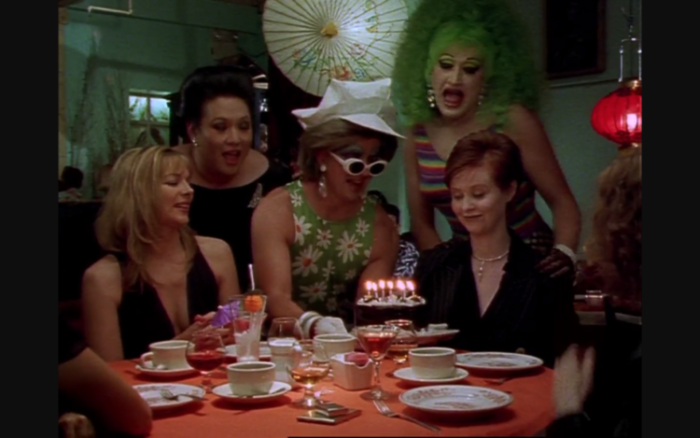 Sex and the City does not appear to be the work of aliens who, having learned of heterosexuality exclusively through perfume advertisements, decided to make a half-hour romantic comedy-drama series on the topic. Sex and the City appears, instead, to be the work of humans who, in the wake of the aforementioned show's wild success on Zolgnar-5, attempted to adapt it for an American audience, The Office-style, without speaking a word of Zolg. It's straight people, as imagined by straight people, as imagined by straight people.
Sex and the City does not appear to be the work of aliens who, having learned of heterosexuality exclusively through perfume advertisements, decided to make a half-hour romantic comedy-drama series on the topic. Sex and the City appears, instead, to be the work of humans who, in the wake of the aforementioned show's wild success on Zolgnar-5, attempted to adapt it for an American audience, The Office-style, without speaking a word of Zolg. It's straight people, as imagined by straight people, as imagined by straight people.
I assume this is why the show is frequently as relatable as an abduction fantasy. Brecht's famous alienation effect, in which the audience is reminded that they are watching a play, while functionally useless in a world where audiences never actually forget that they are watching plays (at least if my college's very serious production of The Laramie Project is any indication), proves tremendously effective as a refuge for terrible writing.
Of course, writer characters in film and television are universally terrible at writing. ("Cupid has flown the co-op"—you can just taste the satisfaction of whoever stuck this in a Carrie Bradshaw column instead of working on their novel.) Like many writer-cum-narrators, Carrie is a blatant plot device, an excuse for the writers' room to leave its narrative string-pulling exposed. It's true, of course, that all decent television shows need an intradiegetic explanation for their extradiegetic episodicity. Buffy the Vampire Slayer's "monster of the week" model, as well as its endless supply of Central Casting vamps, could be chalked up, often winkingly, to the fact that Buffy's suburban high school happened to sit atop a supernatural transit hub. But Manhattan is not on a Hellmouth, unless it be the infernal portal that is Carrie's brain, extracting weekly themes from the void (modelizers! threesomes! married guys!) for no reason save the banal imperative of a met deadline.
Effectively, then, Carrie becomes a patsy for the show's worst ideas, turning bad plotting into decent characterization through Sarah Jessica Parker's performance. The result is that self-parody gets baked into Sex and the City's narrative form, which is honestly about as invested in the serious study of human behavior as a Fifth Avenue Anthropologie. It knows it's just a show, and it knows you know it's a show, and it's fine with that. That's ballsy, like a shellfish that wears its organs on the outside.

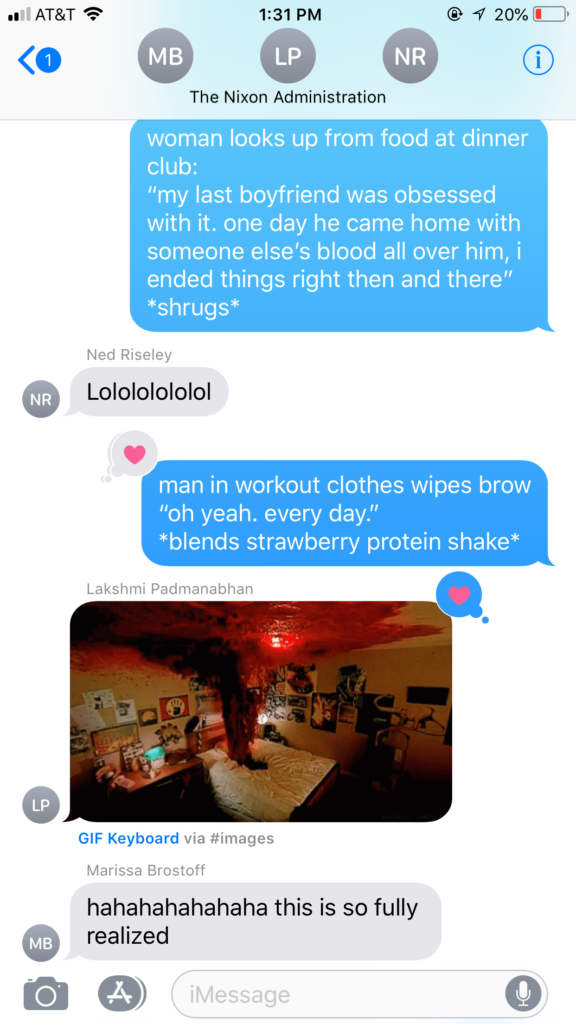 The pacing sprints, as if the writers are trying to outrun their own chainsaw-wielding sanity. It's a strength of the show, then, that it never wastes any of its runtime trying to persuade us that men are desirable, either individually or as a class. The men on this show are not expected to talk, and certainly not to make conversation. They are whisked through montages, like politicians into SUVs, the music and narration huddling around them protectively. Mercifully, we are never put through the agony of having to go on a fully realized date with any of them. They are not people; they are examples. Their job is simply to be there. I am given to believe, though I have no proof of this, that they are supposed to be attractive, or at least were supposed to be, in 1998. I can confirm that they are men. When called upon to speak, they deliver their lines admirably, in near-perfect English.
The pacing sprints, as if the writers are trying to outrun their own chainsaw-wielding sanity. It's a strength of the show, then, that it never wastes any of its runtime trying to persuade us that men are desirable, either individually or as a class. The men on this show are not expected to talk, and certainly not to make conversation. They are whisked through montages, like politicians into SUVs, the music and narration huddling around them protectively. Mercifully, we are never put through the agony of having to go on a fully realized date with any of them. They are not people; they are examples. Their job is simply to be there. I am given to believe, though I have no proof of this, that they are supposed to be attractive, or at least were supposed to be, in 1998. I can confirm that they are men. When called upon to speak, they deliver their lines admirably, in near-perfect English.
Even Mr. Big, who has the potential to be a full person, speaks in short, biscuity sentences, his burly eyebrows bench-pressing his forehead into a permanent state of aloofness, as if to say, "What?" This could be because he fears chitchat will damage his plague-grey upper lip, which appears to have died and been reanimated by an untalented witch, or because the halved pomegranate where his mouth should be is so wet that any sentence over four words will slide right out, like a baby giraffe from its mother. This is a man who opens up as easily as a blister pack. He looks like if skin were a person. He smiles like an onion. His eyes are offshore bank accounts. His dick energy is so small it could solve climate change.
Musically, this show takes place entirely in the elevator of a luxury hotel where a Salsa Singles night is currently underway. Nonimprovisational jazz is a fitting metaphor for people who want freedom from freedom. For all the parafeminist bluster about emotionless fucking and promiscuity, what Carrie says in the pilot obtains, with Aunt Lydia-like rigor, in every shot of every episode: "The right guy comes along, and you two right here, this whole thing? Whish. Right out the window." Sex doesn't replace love, it just keeps its seat warm, like a reptile in the nest of a migratory bird. One day the show will become Love and the Hamptons; it is as inevitable as mold.
This is why actual bursts of deviance are militantly policed. When Charlotte, usually the idealist, drops off the map after purchasing a rabbit vibrator, Carrie and Miranda burst into her apartment FBI-style, the camera tailing them in one long, handheld shot set to electric organ and surf guitar, and then they take away the sex toy which Charlotte literally just bought for herself with her own money, Miranda slipping it into her purse like a dirty cop planning to get high later. It's a brief genre spoof, executed as if in acknowledgment that the show's typical zippy tone wouldn't be able to conceal the magnificent cruelty of the act. No greater crime could there be, in this militantly heterosexual Gotham, than to stay home and feed your pussy.
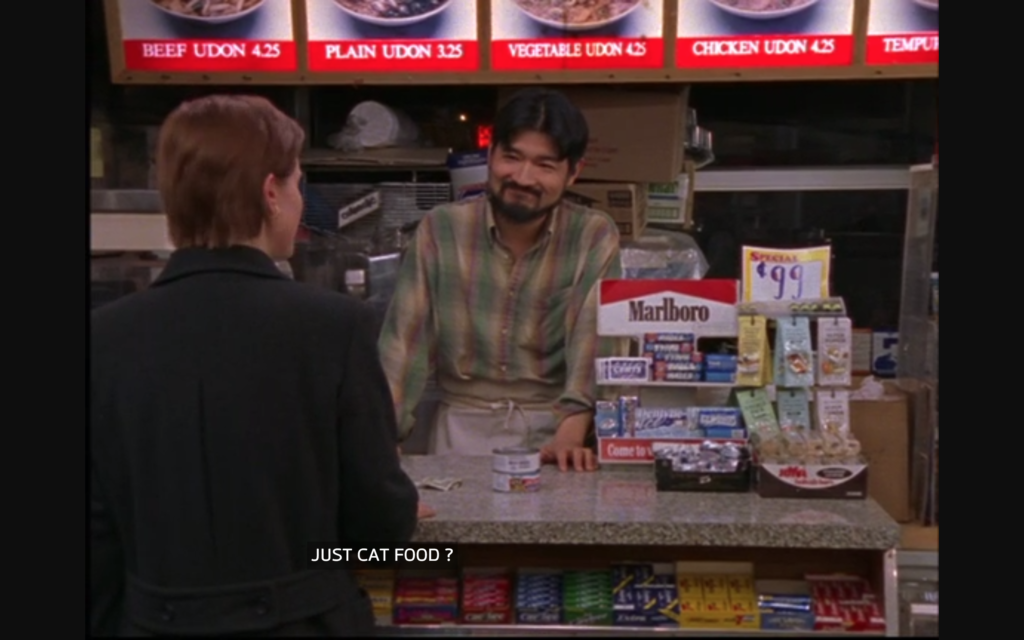
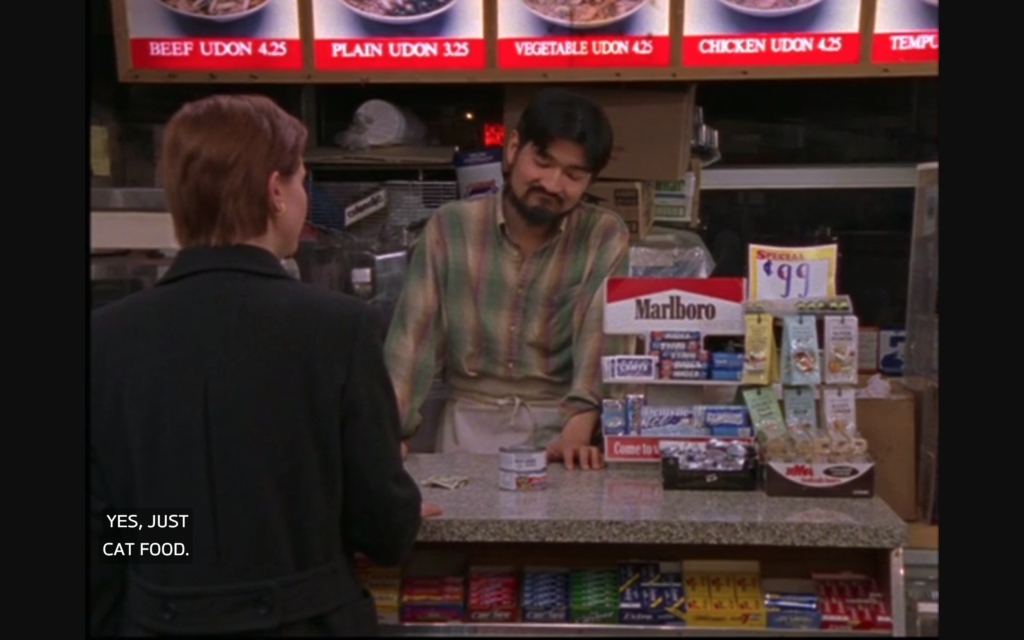
It's the scenes with just the girls, gabbing over brunch or Chinese takeout, where the show really comes alive. The girls are people, even if they're also types, and the show's regard for them—like their affection for each other—is totally involving. That doesn't mean we stray too far from the anthropological banter of Nineties meta-romances like When Harry Met Sally, in which we are reminded that at the end of the day, men are still from Mars and women—well, you know where they're from. But still, there is something about these scenes of female thinking, as Ari put it so beautifully, that sets them apart from the rest of the show.
Maybe I spoke too soon when I said lesbianism wasn't the answer. You've all pointed out how the show keeps smuggling queerness into its plots like outside candy into a movie theater—especially with respect to Miranda, whose pantsuits put the gay back in litigation. I would add that what's on display most often in Sex and the City is a kind of same-sex eroticism whose job is to perform the sensitive caring labor necessary for keeping the dream of the heterosexual good life intact. The phone calls, the late nights, the affectionate nicknames—they pour themselves into each other's lives. When Charlotte's boyfriend asks her to play seventeenth-century backgammon, the girls hold an impromptu salon on anal sex in the back of a moving taxi. When Carrie's indefatigable neighbors start screwing across the alley, the whole sex-starved gang comes over to watch, sucking on candy. This is lesbianism as heterosexuality's fixer, rushing from one crisis to the next like Michael Clayton in Michael Clayton or Ray Donovan in Ray Donovan, disappearing evidence and bribing exes with breezy professionalism.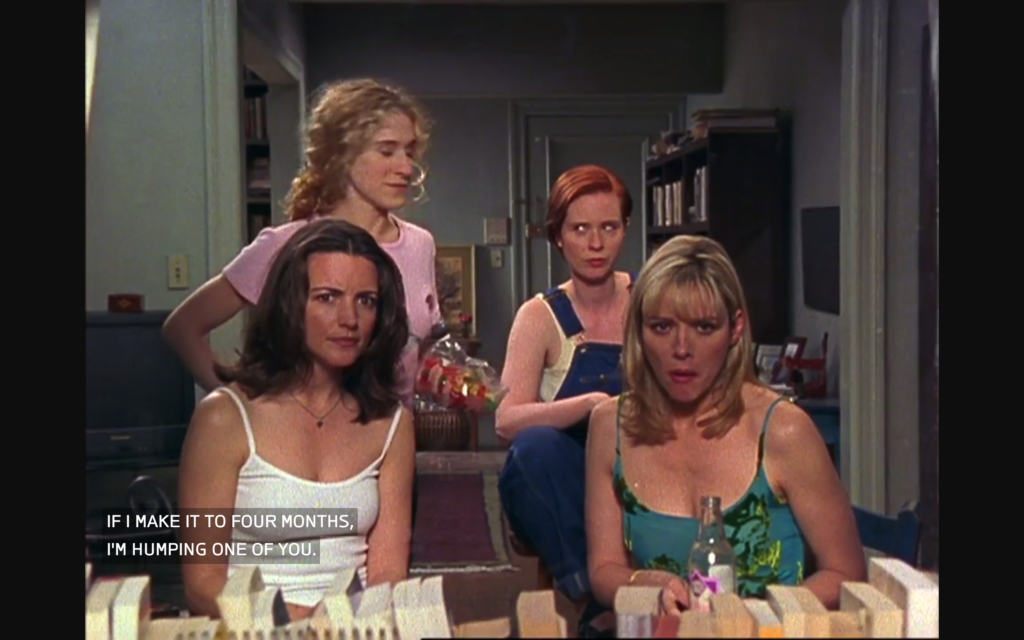
It's a curious thing that heterosexuality, in a show that purports to be taking it into the twenty-first century, doesn't actually work without 24/7 technical support. It is a curiouser thing that, thanks in part to Sex and the City itself, teams of women across America are convinced to provide this technical support for free. Maybe there's some kind of feedback loop at work here: heterosexuality forbids you from being a dyke, then makes you gay for your girlfriends. I'm hardly convinced that any of our protagonists actually like men; what they do seem to like is liking men, because empirically speaking, liking men translates, almost all of the time, into being with women: touching their hair, rubbing their shoulders, sharing their feelings. One would be forgiven for assuming that, in a world such as this, the easiest way to be gay is just to be straight, with the confidence that Mr. Right, like Christ, or Godot, is always coming but never comes. I know many women to whom this applies. They, too, are always coming. They, too, never come.
Love,
Sex,
Andrea
The Slow Burn, v. 4: An Introduction
Ivan Ramos (Guest Post), October 1
Audrey Wollen (Guest Post), October 22
*
The Slow Burn, volume 4, will run in this space all summer. Previous summers can still be found on Post45:
2015: A Summer of Elena Ferrante's Neapolitan Novels - Sarah Chihaya, Merve Emre, Katherine Hill, and Jill Richards
2016: Summer of Knausgaard - Diana Hamilton, Dan Sinykin, Cecily Swanson, and Omari Weekes
2017: Welcome (back) to Twin Peaks - Michaela Bronstein, Len Gutkin, and Benjamin Parker